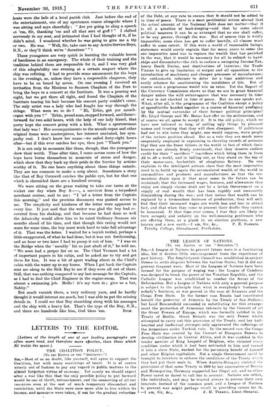THE LEAGUE OF NATIONS.
[TO THE EDITOR OF THE " SPECTATOR.")
Sia,—A League of Nations to prevent future wars is a fascinating idea, but it derives little encouragement from the experience of past history. The Amphictyonic Council was established in ancient Greece to settle disputes between the various States, but it did not prevent frequent wars. Most of the Leagues of Nations have been formed for the purpose of waging was : the League of Cambrai was designed to break the power of the Venetian Republic, and the Catholic League was established to combat the forces of the Reformation. But a League of Nations with only a general purpose is subject to the principle that what is everybody's business is nobody's business, as was proved in the case of Armenia and the Congo Free State. In the former case Russia had constituted herself the protector of Armenia by the Treaty of San Stefano; but Lord Beaconsfield succeeded in substituting for this arrange- ment the protection of Armenian interests by the Concert of all the Great Powers of Europe, which was formally ratified in the Treaty of Berlin. Great Britain was the only Power which attempted to carry out this provision of the Treaty, and her half- hearted and ineffectual attempts only aggravated the sufferings of the Armenians under Turkish rule. In the second case the Congo Free State was created by the Concert of European Powers to develop civilization in Central Africa, and it was confided to the tender mercies of King Leopold of Belgium, who violated every condition under which it had been entrusted to him and turned it into a slave State, worked for the pecuniary benefit of himself and other Belgian capitalists. Not a single Government could be brought to interfere to enforce the conditions of the Treaty which they had put their seals to. When Austria-Hungary violated the provisions of that same Treaty in 1908 by her annexation of Bosnia and Herzegovina, Germany supported Ler illegal act, and no other Power oared or dared to call her to account. Nations are selfish, like individuals, and may be trusted always to pursue their own interests instead of the common good, and a League of Nations to prevent war might perhaps result in providing causes for it.










































 Previous page
Previous page